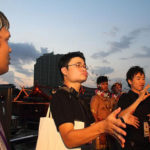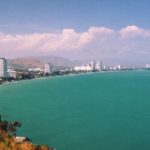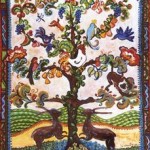Living a life of contradictions–Being homosexual in southern Thailand can cause further isolation in the already divided communities
Bangkok Post
May 8, 2014
By Takato Mitsunaga
Making a major life-changing decision is always a struggle. One has to think about the potential consequences of a choice before deciding on a particular path.
Khoirunnaklee Yusoh, 31, lives in the Krong Pinang district in the Muslim-dominated Yala province in southern Thailand. The deep South continues to be seen as closed and marginalised, primarily because of the current political problems and security issues affecting the divided religious communities.
(photo right: Khoirunnaklee Yusoh at his house in Yala)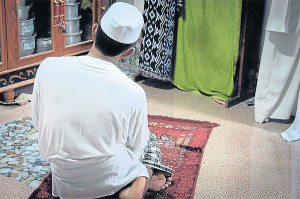
Khoirunnaklee’s problem, however, is neither regional nor political. While cradling his sobbing niece in one hand, he recounts the beginning of a painful period of his life.
“I felt really sad when my family didn’t accept me as gay,” said Khoirunnaklee, who works part-time at a public healthcare centre.
Khoirunnaklee lives in a rural area of Krong Pinang with his mother, sisters and their husbands, nephews and nieces. In total, there are 14 people in his family.
His family and community strictly follow Islamic teachings and their interpretation of the Koran is seen as hostile towards homosexuality. Many in the area suffer from discrimination as a result of their sexual orientation, which further isolates them from the rest of the community. Khoirunnaklee, like many Muslim homosexuals, therefore tends to be caught between the boundaries of their religious beliefs and their sexuality.
“My family, relatives and many people I know in the community came and preached to me not to be gay when I first came out,” said Khoirunnaklee.
“People around me always asked me to be ‘normal’ in order to follow the Koran’s teachings. I know it’s true, but it’s difficult, because I didn’t choose to be gay. I just realised it one day. All I could do was try pretending to be straight.”
Khoirunnaklee once left his hometown in order to try and live “free”. He found a job in Hat Yai, a large city in Songkhla province. This was his first experience living in another place.
“I was really a bad devotee there. I had a boyfriend and committed many same-sex acts. At the same time, I learned how other gay people spent their lives,” he said.
Owing to a strong sense of duty, Khoirunnaklee finally left Hat Yai and his homosexual lifestyle and returned back to his hometown. He cites his father’s death as one of the main reasons for his return. Now, Khoirunnaklee bows five times a day in the direction of Mecca. For him, prayers are an essential part of his daily life.
“I find myself very comfortable when I follow what the Koran teaches me. In the future, I will definitely get married to a woman and have children. That’s why I came back,” he said.
“I chose to be a Muslim myself. Now I’ve decided how I will live. I’m more afraid of not being accepted by God.”
The two sides of the issue
Two years ago, the Yala Provincial Public Health Office, along with the Rainbow Sky Association of Thailand (RSAT), held a seminar to promote a better understanding and life for members of the lesbian, gay, bisexual and transgender (LGBT) community.
“It didn’t work well,” said Suprrda Phiban, a senior public health technical officer at the Yala office.
“People were not able to openly talk about the issues associated with their sexuality in this society because of the religiously-induced limitations. This was why we have not held the event since.”
Another gay Muslim, Mahrodee Lame, who is currently working as a university officer in Yala city, has experienced these limitations of expression all his life. This, the 29-year-old man believes, is due to people’s limited understanding of the LGBT community.
“When I was a kid, I was a little feminine, but none of my friends cared about my appearance back then, but as the time went by my friends learned to keep their distance from me,” said Mahrodee.
“They mistook me for a katoey as it seemed like they didn’t know what my gender or sexuality was. Even now, I feel like they misunderstand me. I guess most people around me really believe that it [homosexuality] can be cured by medical treatment.”
An article last March on Muslimthaipost.com, the most visited website by Thai Muslims, states that gay and transgender people can be cured by seeing a medical doctor. It even suggests one particular doctor.
“As for the reason they become gay,” the author of the article writes, “it may be because their families brought them up the wrong way, or the environment made them so. These people have to adapt themselves to what Islam teaches.”
Abdullatif Karee, the vice-director of the Faculty of Islam Studies and Law at Fatoni University, agrees that those from the LGBT community need to adapt.
“Islamic teachings accept the fact of the existence of LGBT people, but see it as a mission from God that they must overcome,” said Abdullatif.
He added that Islamic teachings do not permit Muslims to blame or make fun of gay people. Rather the opposite, it teaches people to help them walk the “right path”. The family of LGBT people are often required to take on this role.
“We can’t insult or hate them. It’s also against the teachings, but we can’t let them be [gay] because it is against God’s teachings too,” Abdullatif said.
“Islam teaches us to respect each other under the teachings of the religion.”
Peranat Pruksarat, is a heterosexual Musilm and a second-year student from the Faculty of Humanities and Social Sciences at the Prince of Songkla University. He takes a more open view with regards to homosexuality.
“I think that Islamic teachings give people the right to choose, or not choose, the religion. It depends on each person what they choose to rely on, but once they believe in it willingly, they must follow what it teaches.”
Last December, Peranat attended a sexual identity workshop hosted by non-Muslim Anticha Sangchai, an activist and lecturer at the Faculty of Humanities and Social Sciences on the Pattani campus of the Prince of Songkla University. Anticha organised the workshop at her book cafe — Buku Books — with the aim to give people a sense of the issue based on her own research and experiences.
Anticha has been living in Pattani for about eight years and runs the bookshop in Pattani with her lesbian partner, who also works for Prince of Songkla University.
“There are two ways that gay Muslim men can move forward: move to the city, or stay where they are as a straight man to fulfil God’s expectations. Both of them are correct, but the important thing is that they know all about the issue beforehand to broaden their possibilities,” said Anticha.
Anticha advocates a wider understanding of gender and sexuality through the workshop, but she realises that the tenants of Islam deters many individuals from attending workshops. “One male participant was going to join the workshop, but he told me, right in front of the cafe, that he would not join because he was afraid someone might know he was there. You see, many people are interested in the topic, but they are not allowed to talk about it.”
She believes that it should be a human right to be able to choose who to be and how to act, even if the way some people choose to act and define themselves is against Islamic beliefs, no one has the right to stop them.
“My objective is not to condemn the Islamic teachings, but to provide space and time to people so they can talk without hesitation or fear.
“There are no exact answers in this workshop, but people must choose their own paths after that,” said Anticha.
She dedicated two years of preparation to last December’s event and that first workshop was one of three that she plans to hold.
“I did a lot research before the first workshop was actually held — because if I didn’t do it properly, how could people truly understand the issue?
“During the research I found a case about one gay Muslim who was living in a male dormitory. One day he disclosed that he was gay and his friends punished him because of that.
“They don’t have the right to judge, only God can judge him,” she said.
“The problem is that people in the South don’t know much about the current gender and sexuality issues talked about in urban areas, so they don’t accept people who are gay, even though the problem only lies between these individuals and God.”
The weaknesses of LGBT activists
The struggle for dialogue on sexual minority issues doesn’t only lie in the attitude of the community.
Since the southern provinces are generally considered dangerous places, activists are not eager to go and see how people spend their lives there. Anticha refers to this as the weakness of Thai LGBT activists.
“Even if they suddenly come up and hold the event, it would fail, because they don’t know the region. They don’t know how people live here,” she said.
“I’m not a Muslim, but I’ve been here for eight years. I’m close to these people. If there were activists who wanted to work together with my project, it would definitely benefit both the people in the South and the activists themselves.”
One LGBT activist from Bangkok, Sattara Hattirat, a core member of LGBT organisation Togetherness for Equality and Action (TEA) Group did join the last workshop as a guest lecturer. Through the lecture, participants were able to learn about how the issues are treated differently in Bangkok.
“I wanted to see how sexual orientation and identity could be discussed in a Thai Muslim context,” explains Sattara.
Sattara thinks that activists like Anticha are integral in helping people understand the issue.
“I don’t know any LGBT activists in Thailand who look at the issues in the Muslim context other than Anticha. What she is doing is really brave.” Anticha has a clear strategy for the coming months. The workshop last December was just the first of three steps she intends to take, with the next taking place as soon as possible.
Those who attended the previous Buku Books workshop can go forward onto the next step, together with other participants and complete all three steps together.
The first workshop provided the knowledge about gender and sexuality, the second step conveyed how the international community considers the issues. Participants learned what gender and sexuality were through several case studies, which they then discussed. The final step, Anticha hopes, is for other participants to perhaps become activists themselves.
“They have to become activists, but, at the very least, I really hope they will be eager to advocate what they learn beyond this workshop.”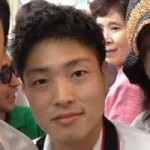
About the author: Takato Mitsunaga is a
freelance journalist studying journalism in Thammasat University in Bangkok. (photo right)

